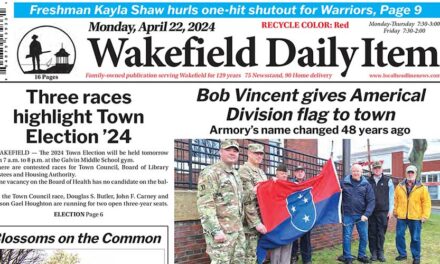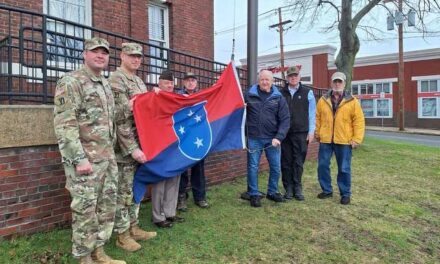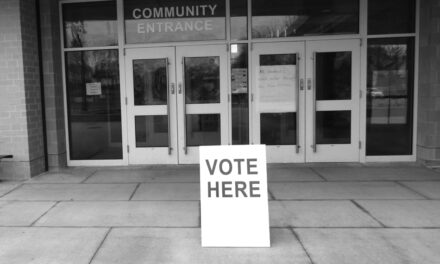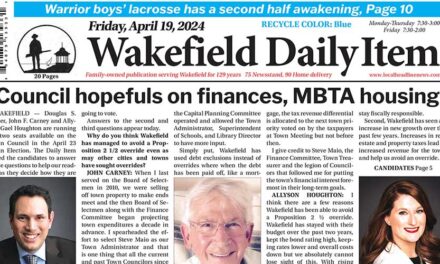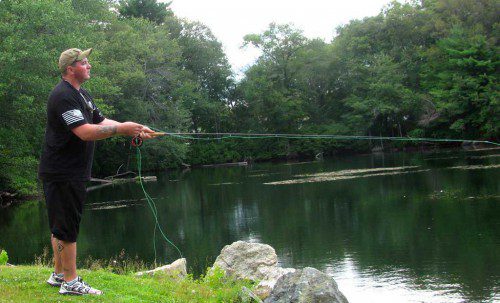
GREG FOWLE of Woburn, an Iraq War combat veteran, casts his line in Patkin Pond behind the Malden Anglers Club in Saugus at last Wednesday evening’s Project Healing Waters Fly Fishing program.
Published in the July 27, 2015 edition
By MARK SARDELLA
SAUGUS — “Fly fishing never takes you to an ugly place,” says Wakefield’s Joe Cresta, who runs a local chapter of “Project Healing Waters Fly Fishing,” a national program that helps disabled veterans heal through the sport of fly fishing.
Fly fishing, Cresta points out, usually involves places like mountains, rivers and lakes.
A Wakefield native and 1998 graduate of Wakefield Memorial High School, Cresta started the local chapter of Project Healing Waters about two years ago out of the Malden Anglers Club at 229 Main St. in Saugus, less than a mile from Wakefield. Cresta is also the current president of the Malden Anglers Club. The club’s headquarters is right on the three-acre Patkin Pond.
Project Healing Waters Fly Fishing (PHWFF) began in 2005 serving wounded military service members at Walter Reed Army Medical Center returning from combat in Iraq and Afghanistan. Since then, PHWFF has expanded nationwide, establishing its highly successful program in Department of Defense hospitals, Warrior Transition Units and Veterans Affairs Medical Centers and clinics.
Cresta, a Marine Corps veteran, says that the local program is a little different than some of the other PHWFF programs, which take place at Veterans Administration hospital settings.
“We were trying to attract younger veterans from Iraq and Afghanistan who don’t want to go to the VA due to issues with the VA,” Cresta says. He notes that the Project Healing Waters programs run out of VA hospitals tend to cater to older disabled veterans of World War II, Korea and Vietnam, many of whom live in the facilities.
“We thought this would be a more comfortable setting for the younger guys,” Cresta says, rather than going to a sterile, hospital setting. He says that that about four to six veterans have been regularly coming to the program held at the club on the second and fourth Wednesday of every month. He stresses that veterans of all ages and with all levels of disability are welcome.
Twenty-seven-year-old Greg Fowle of Woburn is a 2007 graduate of Northeast Metro Tech in Wakefield and a U.S. Army combat veteran who served in Iraq from 2008 to 2009. He started coming to the Saugus Project Healing Waters program in June. He says he’s been fishing since he was 3 years old, but wasn’t so sure about fly fishing until a friend introduced him to it.
“Since then I was hooked,” Fowle says. He came to Project Healing Waters to learn more. He says he’s gained a lot of knowledge from the program and from members of the club.
“Fishing is my therapy,” Fowle says. “There’s nothing better than being on the water.”
Cresta says that two of the biggest misconceptions are that fly fishing is expensive and difficult to learn. On the contrary, he says that with about $100 worth of equipment the basics can be learned in a couple of hours.
But for the disabled veterans in the Project Healing Waters program, there is no equipment cost. “All the equipment is free for the program through donations,” Cresta says.
Despite being easy to learn, both Cresta and Fowle agree that the reason fly fishing is good therapy for disabled veterans is because there’s more involved than just dropping a line in the water and waiting.
“Fly fishing is more of a thought process, more focused,” Cresta says, so there’s less of a tendency for the mind to wander. Its physical aspects can also help disabled veterans with mobility issues.
Fowle agrees.
“With fly fishing you can’t just sit there and drink,” he says. “There are a lot of veterans with alcohol problems. My addiction is fishing, not drugs or alcohol. It’s more rewarding and you don’t wake up feeling like crap.”
The program also offers the camaraderie of being around other veterans as well as the structure of a regular schedule that some veterans miss when they return to civilian life.
“Mentally, I look forward to it,” Fowle says. “On Wednesdays, I get to go fly fishing.”
Cresta would really like to get more disabled vets from the local area to take advantage of the program.
“The local Veterans Services Officers have been a big help in getting people here,” Cresta says, mentioning Wakefield/Saugus VSO Alicia Reddin and Veterans Services Director Ryan McLane by name.
Reddin returns the compliment.
“Joe Cresta is a truly impressive man and is dedicated to modeling the idea of veterans helping veterans,” Reddin says. “He has spent a great deal of time reaching out to veterans in the community as well as to service providers. All of the club members I have come across are so supportive of this program and many are also veterans.”
Reddin, a U.S. Navy veteran, says that she has experienced first-hand the benefits of the Project Healing Waters program.
“I support this not only as a Veterans Services Officer but also because I participate in this program as a therapeutic event,” she says. “All are welcome here. If you are a veteran of any age with a VA rating 0-100 percent, please contact myself or Joe directly. This is a great supportive group and we all share a commonality in our experiences that others cannot relate to.”
Cresta and Fowle stress that the networking and mutual support among veterans is another huge benefit of Project Healing Waters program.
“If someone is down and out,” Cresta says, “just coming here can turn the whole thing around.”
Fowle agrees.
“If I see another vet who is struggling, I’ll pick him up,” he says. “We won’t leave him behind.”
Project Healing Waters meets on the second and fourth Wednesday of every month at 6:15 p.m. at Malden Anglers Club, 227 Main St. in Saugus. For more information, contact Joe Cresta at 781-603-6669 (e-mail: cuffs1980@yahoo.com) or Wakefield Veterans Services Officer Alicia Reddin at 781-246-6377 (e-mail: areddin@cityofmelrose.org).

